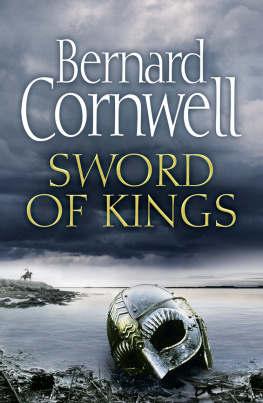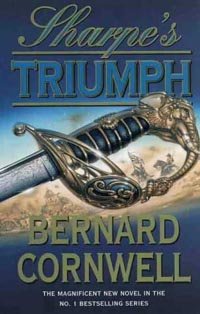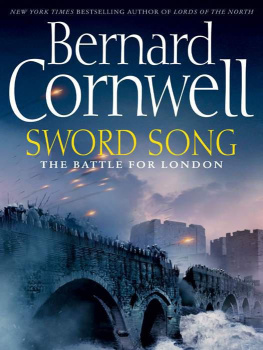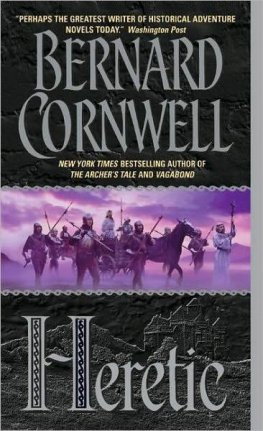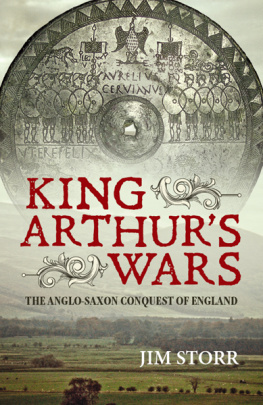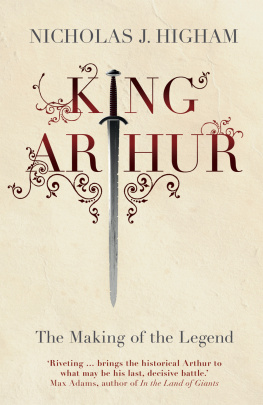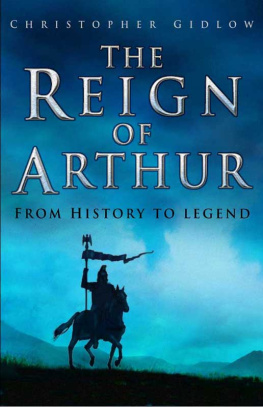EXCALIBUR
by Bernard Cornwell

PART ONE
The Fires of Mai Dun
Women, how they do haunt this tale. When I began writing Arthurs story I thought it would be a tale of men; a chronicle of swords and spears, of battles won and frontiers made, of ruined treaties and broken kings, for is that not how history itself is told? When we recite the genealogy of our kings we do not name their mothers and grandmothers, but say Mordred ap Mordred ap Uther ap Kustennin ap Kynnar and so on all the way back to the great Beli Mawr who is the father of us all. History is a story told by men and of mens making, but in this tale of Arthur, like the glimmer of salmon in peat-dark water, the women do shine.
Men do make history, and I cannot deny that it was men who brought Britain low. There were hundreds of us, and all of us were armed in leather and iron, and hung with shield and sword and spear, and we thought Britain lay at our command for we were warriors, but it took both a man and a woman to bring Britain low, and of the two it was the woman who did the greater damage. She made one curse and an army died, and this is her tale now for she was Arthurs enemy.
Who? Igraine will demand when she reads this.
Igraine is my Queen. She is pregnant, a thing that gives us all great joy. Her husband is King Brochvael of Powys, and I now live under his protection in the small monastery of Dinnewrac where I write Arthurs story. I write at the command of Queen Igraine, who is too young to have known the Emperor. That is what we called Arthur, the Emperor, Amherawdr in the British tongue, though Arthur himself rarely used the title. I write in the Saxon tongue, for I am a Saxon, and because Bishop Sansum, the saint who rules our small community at Dinnewrac, would never allow me to write Arthurs tale. Sansum hates Arthur, reviles his memory and calls him traitor, and so Igraine and I have told the saint that I am writing a gospel of our Lord Jesus Christ in the Saxon tongue and, because Sansum neither speaks Saxon nor can read any language, the deception has seen the tale safe this far.
The tale grows darker now and harder to tell. Sometimes, when I think of my beloved Arthur, I see his noontime as a sun-bright day, yet how quickly the clouds came! Later, as we shall see, the clouds parted and the sun mellowed his landscape once more, but then came the night and we have not seen the sun since.
It was Guinevere who darkened the noonday sun. It happened during the rebellion when Lancelot, whom Arthur had thought a friend, tried to usurp the throne of Dumnonia. He was helped in this by the Christians who had been deceived by their leaders, Bishop Sansum among them, into believing that it was their holy duty to scour the country of pagans and so prepare the island of Britain for the second coming of the Lord Jesus Christ in the year 500. Lancelot was also helped by the Saxon King Cerdic who launched a terrifying attack along the valley of the Thames in an attempt to divide Britain. If the Saxons had reached the Severn Sea then the British kingdoms of the north would have been cut off from those of the south, yet, by the grace of the Gods, we defeated not only Lancelot and his Christian rabble, but Cerdic also. But in the defeat Arthur discovered Guineveres treachery. He found her naked in another mans arms, and it was as though the sun had vanished from his sky.
I dont really understand, Igraine said to me one day in late summer.
What, dear Lady, do you not understand? I asked.
Arthur loved Guinevere, yes?
He did.
So why could he not forgive her? I forgave Brochvael over Nwylle. Nwylle had been Brochvaels lover, but she had contracted a disease of the skin which had disfigured her beauty. I suspect, but have never asked, that Igraine used a charm to bring the disease to her rival. My Queen might call herself a Christian, but Christianity is not a religion that offers the solace of revenge to its adherents. For that you must go to the old women who know which herbs to pluck and what charms to say under a waning moon.
You forgave Brochvael, I agreed, but would Brochvael have forgiven you?
She shuddered. Of course not! Hed have burned me alive, but thats the law.
Arthur could have burned Guinevere, I said, and there were plenty of men who advised him to do just that, but he did love her, he loved her passionately, and that was why he could neither kill her nor forgive her. Not at first, anyway.
Then he was a fool! Igraine said. She is very young and has the glorious certainty of the young.
He was very proud, I said, and maybe that did make Arthur a fool, but so it did the rest of us. I paused, thinking. He wanted many things, I went on, he wanted a free Britain and the Saxons defeated, but in his soul he wanted Guineveres constant reassurance that he was a good man. And when she slept with Lancelot it proved to Arthur that he was the lesser man. It wasnt true, of course, but it hurt him. How it hurt. I have never seen a man so hurt. She tore his heart.
So he imprisoned her? Igraine asked me.
He imprisoned her, I said, and remembered how I had been forced to take Guinevere to the shrine of the Holy Thorn at Ynys Wydryn where Arthurs sister, Morgan, became her jailer. There was never any affection between Guinevere and Morgan. One was a pagan, the other a Christian, and the day I locked Guinevere into the shrines compound was one of the few times I ever saw her weep. She will stay there, Arthur told me, till the day she dies.
Men are fools, Igraine declared, then gave me a sidelong glance. Were you ever unfaithful to Ceinwyn?
No, I answered truthfully.
Did you ever want to be?
Oh, yes. Lust does not vanish with happiness, Lady. Besides, what merit is there in fidelity if it is never tested?
You think there is merit in fidelity? she asked, and I wondered which young, handsome warrior in her husbands caer had taken her eye. Her pregnancy would prevent any nonsense for the moment, but I feared what might happen after. Maybe nothing.
I smiled. We want fidelity in our lovers, Lady, so is it not obvious that they want it in us? Fidelity is a gift we offer to those we love. Arthur gave it to Guinevere, but she could not return it. She wanted something different.
Which was?
Glory, and he was ever averse to glory. He achieved it, but he would not revel in it. She wanted an escort of a thousand horsemen, bright banners to fly above her and the whole island of Britain prostrate beneath her. And all he ever wanted was justice and good harvests.
And a free Britain and the Saxons defeated, Igraine reminded me drily.
Those too, I acknowledged, and he wanted one other thing. He wanted that thing more than all the others. I smiled, remembering, and then thought that perhaps of all Arthurs ambitions, this last was the one he found most difficult to achieve and the one that the few of us who were his friends never truly believed he wanted.
Go on, Igraine said, suspecting that I was falling into a doze.
He just wanted a piece of land, I said, a hall, some cattle, a smithy of his own. He wanted to be ordinary. He wanted other men to look after Britain while he sought happiness.
And he never found it? Igraine asked.
He found it, I assured her, but not in that summer after Lancelots rebellion. It was a summer of blood, a season of retribution, a time when Arthur hammered Dumnonia into a surly submission. Lancelot had fled southwards to his land of the Belgae. Arthur would dearly have loved to pursue him, but Cerdics Saxon invaders were now the greater danger. They had advanced as far as Corinium by the rebellions end, and might even have captured that city had the Gods not sent a plague to ravage their army. Mens bowels voided unstoppably, they vomited blood, they were weakened until they could not stand, and it was when the plague was at its worst that Arthurs forces struck them. Cerdic tried to rally his men, but the Saxons believed their Gods had deserted them and so they fled. But theyll be back,


